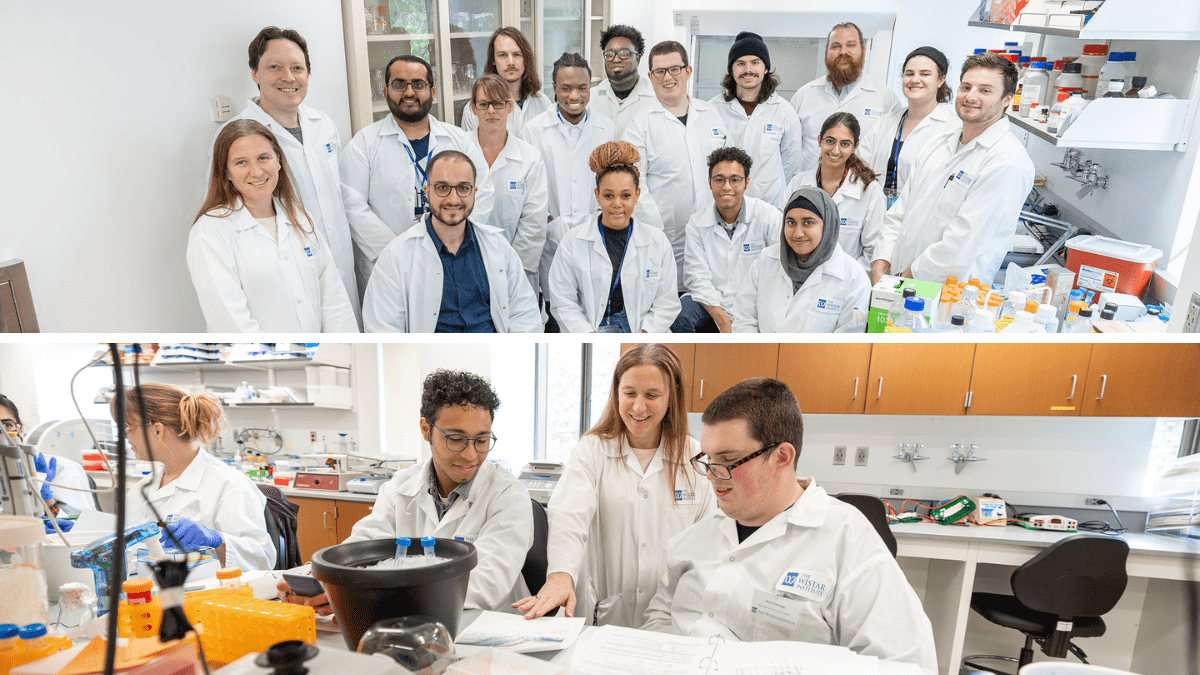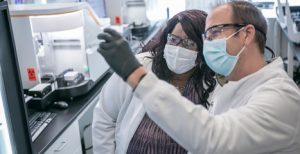
(SOURCE: The Wistar Institute)
The Wistar Institute Spearheads Efforts to Support Biotechnology and Biomedical Education
By Mark Terry
February 7, 2023
Founded in 1892, The Wistar Institute is the U.S.’s first independent biomedical research institute. It is located on the campus of the University of Pennsylvania but is separate from the university. Part of the Institute’s mission is education. The organization even notes that during World War I, when most of Europe couldn’t print or publish technical materials, the Institute distributed thousands of scientific journals to the scientific community.
BioBuzz spoke with Kristy Shuda McGuire, Ph.D., Dean of Biomedical Studies and Associate Professor, Molecular & Cellular Oncogenesis Program at the Ellen and Ronald Caplan Cancer Center, part of The Wistar Institute. She noted that they had recently “coalesced our education and training program into our new Hubert JP Schoemaker Education and Training Center.”
The Biomedical Technician Training Program
“We love our Biomedical Technician Training Program,” McGuire notes. “It’s really our signature education and training program.” The initiative was recently recognized as the 2022 BioBuzz Workforce Champion of the Year.
The program was developed in 2000 by Dr. William Wunner of the Institute in partnership with the Community College of Philadelphia. In 2019 it launched a registered pre-apprenticeship that can direct students into Wistar’s Fox Biomedical Research Technician (BRT) Apprenticeship.

It got off to a rocky start with plans to launch a summer program in 2020, which couldn’t be opened due to the COVID-19 pandemic. “Selected students thought they were going to complete what had been a two-summer program, starting in May of 2020 and finish it in August 2021. We felt awful for those students and wanted to figure out a way we could still keep that promise, where they could finish a Biomedical Technician Training Program in August of 2021,” McGuire said.
So Wistar applied for a grant from GlaxoSmithKline’s Philadelphia STEM Equity Collective (PSEC). Founded in January 2020, the PSEC was designed to improve STEM equity, access, and inclusion in STEM careers for Philadelphia students traditionally underrepresented. GSK initiated the Collective in collaboration with the Philadelphia Education Fund.
“The Collective is designed to increase the number of Black, Latinx, and women going into STEM careers. We were one of their inaugural grantees, and that helped us to take our program from a two-summer program to a one-summer program,” McGuire said.
She added that they received a second grant from the PSEC to expand the program. They have also received grant support from the Commonwealth of Pennsylvania Department of Labor and Industries’ PA Smart Program and the National Science Foundation Advanced Technological Education Program. The latter program, McGuire says, “is really geared toward community college students. What we’re doing over three years is increasing the size of the cohort and the regional partners for the program.”
They have since added students from Montgomery County Community College. This year they also plan to add students from Bucks County Community College and Camden County College in New Jersey. And in the last year, the grant will add Delaware County Community College (Delaware County, Pa.), which also serves Chester County.
“So really, we’re taking our program from a collaboration between Wistar and the Community College of Philadelphia and making it a regional program for community college students. We’ve also extended the program by partnering with West Philadelphia Skills Initiative. And for this second cohort, where we have participants in progress, midway through the program right now, the minimum education requirement was just a high school diploma or a GED,” McGuire says.
In that situation, rather than taking prerequisite courses at a community college, the participants took a prerequisite course called Life Science Foundations developed and taught at Wistar. McGuire notes, “So we’ve done community college down to high school. And then the PAsmart funding has also allowed us this summer to recruit students from four-year colleges and universities who are either residents of Pennsylvania or attending a four-year college or university in Pennsylvania.”
McGuire says that the program trains people to be laboratory technicians or research assistants, which can be a career in themselves, or can be an entry-level position into further education, such as graduate or professional schools.
She adds that they have taken the concept of the Biomedical Technician Training Program as a pre-apprenticeship leading into the Biomedical Research Technician Apprenticeship (now named the Fox Biomedical Research Technician Apprenticeship). Essentially the apprenticeship requires a full-time position, while the pre-apprenticeship is designed to give participants the essential skills they need to get the full-time position as part of the apprenticeship program.
They have also won a grant from the U.S. Economic Development Administration to support the program, which they are working to register as a Quality Science Pathway Apprenticeship. Quality science is in great demand in biotechnology and the life sciences but is typically limited to on-the-job training.
“After we register the apprenticeship, we’ll go back and also create a pre-apprenticeship for that. And again, Quality science is another under-looked career option in the area that is critical for bringing science from the bench to the patient’s bedside,” McGuire says.
More than the science
The Hubert JP Schoemaker Education and Training Center was named after Dutch biotechnologist Hubert Jacob Paul Schoemaker, who co-founded and was president of Centocor. Schoemaker, who passed away in 2006, licensed the technology for monoclonal antibodies from The Wistar Institute to found Centocor. The company was later acquired by Janssen, which is part of Johnson and Johnson.
McGuire says, “Something else we’re trying to expand at Wistar is this idea of training for bio-entrepreneurship.” Her associate dean, David Zuzga, Ph.D., worked with the VP of Business Development, Heather Steinman, Ph.D., MBA, to develop a course called Life Science Innovation.
“What students did,” McGuire says, “is worked in a team as if they had licensed intellectual property from Wistar using real protected intellectual property. They choose their IP to work on, and then over the course of the semester they develop business plans. So they learn about the science, the IP, the clinical steps that need to happen to be able to get a new diagnostic or treatment onto the market. And at the end of the semester, it results in a Shark Tank-style pitch competition.”
In addition, in 2020 they launched a program with Cheyney University of Pennsylvania, the nation’s first historically black college or university. Those students were the first to complete the course. Currently, they have students from Cheyney, as well as La Salle University, enrolled in the course. They have also extended the opportunity to participate to the graduate students and postdoctoral fellows at Wistar.
Fostering essential skills for a stronger workforce
Part of the reason The Wistar Institute has such a strong educational and outreach component is self-serving — to generate the kinds of skilled workers who can work at the Institute. And, of course, to move out into the rapidly growing biotechnology sector in and around Philadelphia and the rest of the world.
McGuire says, “We see our Biomedical Technician Training, pre-apprenticeship and other versions of pre-apprenticeships, that we develop as really giving participants those essential skills so that they can get the full-time position as part of the apprenticeship program. What we teach are general biomedical laboratory techniques that are really applicable to a number of laboratories, both in academia and in industry.”
- About the Author
- Latest Posts
Mark Terry is a freelance writer, editor, novelist and ghostwriter. He holds a degree in microbiology & public health and spent 18 years in infectious disease research and clinical and research genetics prior to his transition to a writing career. His areas of expertise include biotechnology, pharma, clinical diagnostics, and medical practice management. He has written literally thousands of articles, as well as market research reports, white papers, more than 20 books, and many other written materials. He currently lives in Michigan with his family.








